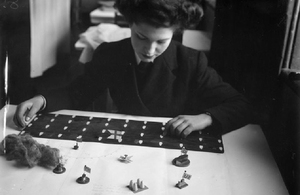Women winning battles: Recreating the Wrens unit which helped win the War
Dstl staff recreate World War Two war gaming which helped win the Battle of the Atlantic

Wren modelling U-boat attacks and defences
Dstl staff have recreated the work of a World War Two unit which was set up to help stop U-boat attacks on Allied ships.
The Western Approaches Tactical Unit (WATU) was formed of officers and rating from the Women’s Royal Naval Service, or Wrens. Despite rudimentary facilities, more than 5,000 officers were trained by the women; operational analysts and war gamers who helped to win the Battle of the Atlantic.
Modern-day war-gamers from Dstl teamed up with today’s Royal Navy to recreate the work of the WATU at the Liverpool War Museum on Saturday.
Last weekend saw the anniversary of one of the most important achievements of the unit. The Wrens discovered – and successfully modeled a response to – a new acoustic torpedo. Their work foiled the German’s use of this weapon for the remainder of the war.
Alison Davis, from the software and model support team at Dstl, who is leading the project said:
We still use war gaming, just like the Wrens of the WATU, albeit in a modern form. Partnership with the Royal Navy and other front line commands allows us to look at a huge variety of scenarios and how we might respond.
The women of the WATU had a difficult job, bringing together doctrine and intelligence on what was basically the floor, but their efforts helped those fighting on the high seas hundreds of miles away.
Some of the families of Wrens who worked in Liverpool attended the event, as will Navy officers from HMS Collingwood.
After the war, Captain Roberts summed up the link between scientists and officers, something which continues to be vital today. He said:
One other lesson of this battle which I think is very important is the value of the closest and most constant co-operation between the staffs and the scientists.
Before the War, I do not think it ever occurred to any officer that gentlemen in grey flannel and sometimes thick spectacles would, in many respects, be able to teach him his business in directing operations of war, and would tell him things which he did not know about the killing of U-boats. I have no hesitation in saying, from some little experience of command in war, that the operational research scientist is an absolutely indispensable member of the fighting staff of any important headquarters in these modern times.
For more information visit the Liverpool War Museum website